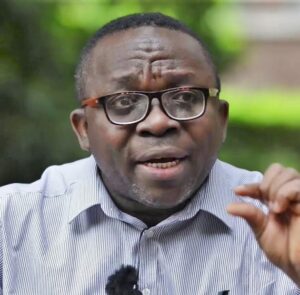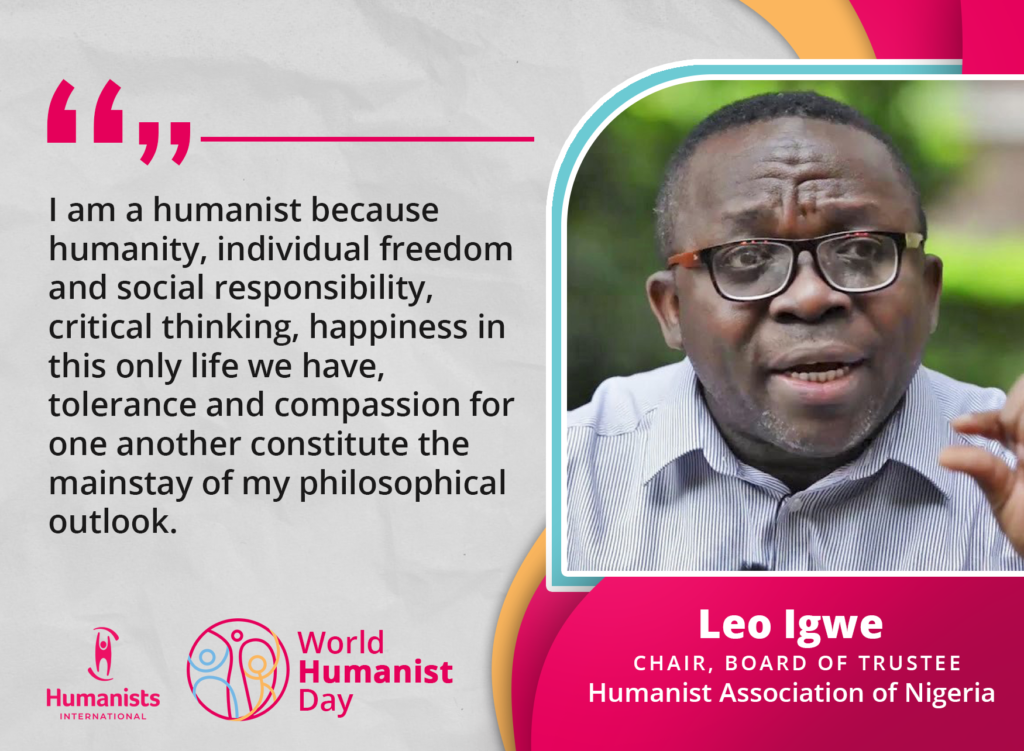
Leo Igwe
- Location / Nigeria
- Reason for persecution / Harmful traditional practices
- Current Status / Under threat
- Last Updated / 21 July 2022
- Country of Origin / Nigeria


Leo Igwe, Board Member of Humanists International
July
Helen Ukpabio, a notorious witch-hunter and Christian fundamentalist, threatens to sue Igwe for alleged ‘defamation’. Ukpabio’s lawyers accused Leo of making prejudicial statements that impacted her social and economic standing. They demanded Igwe retract all articles deemed defamatory, publish an apology in all outlets in which his writings had been published, and pay 20,000,000,000 Naira (approx. US$ 52.7 million) in compensation. There is no evidence to connect Igwe to the offending articles listed in the letter and Igwe denies any connection to them.
Igwe founded Advocacy for Alleged Witches (AfAW) with the goal of “using compassion, reason, and science to save lives of those affected by superstition” – and Humanists International supported the project with a grant.
11 January 2011
Igwe was detained and beaten by police after rescuing two children accused of witchcraft. Igwe was released after a night in jail, following interventions by Humanists International.
July
An estimated 200 followers of Ukpabio stormed a seminar on witchcraft and the rights of the child at which Igwe was due to speak. After the police intervened, Ukpabio filed a petition against Igwe and others claiming 200 billion naira ($.1.3 million dollars) in damages for allegedly violating her fundamental right to believe in witchcraft. The court dismissed the petition in December 2010.
 Leo Igwe was born in Nigeria in 1970 and grew up in the southeast in a Catholic household. Dedicating his whole life to the promotion of humanism, Igwe is a leading human rights defender and humanist in Africa, having formed the Humanist Association of Nigeria in 1990. Igwe has fought for reason against superstition and witchcraft for years and started the campaign Advocacy for Alleged Witches that has helped many victims accused of witchcraft throughout Africa. Igwe was appointed to the Board of Humanists International in 2020.
Leo Igwe was born in Nigeria in 1970 and grew up in the southeast in a Catholic household. Dedicating his whole life to the promotion of humanism, Igwe is a leading human rights defender and humanist in Africa, having formed the Humanist Association of Nigeria in 1990. Igwe has fought for reason against superstition and witchcraft for years and started the campaign Advocacy for Alleged Witches that has helped many victims accused of witchcraft throughout Africa. Igwe was appointed to the Board of Humanists International in 2020.
In recognition of his services to humanism, Igwe has received several awards, including being the two-time recipient of the Distinguished Services to Humanism Award (2014, 2017). In 2021, Igwe was awarded the Heart of Humanism Award by the Foundation Beyond Belief in recognition of his advocacy efforts on behalf of his colleague Mubarak Bala and his work on witchcraft-related persecution.
Approximately half of the population are Muslims, around 40% are Christians, and about 10% are of traditional indigenous religions or no religion. Non-religious people face social persecution and prohibitive social taboos in Nigeria. Indeed, it took 17 years of campaigning for humanist and atheist groups – such as the Humanist Association of Nigeria, the Northern Nigeria Humanist Movement, the Atheist Society of Nigeria, and Lagos Humanists – to be allowed by the State to register as official organizations.
“Apostasy” and “blasphemy” are prohibited by law and punishable by death in the Sharia systems that operate in parallel with Customary systems in Northern states.
In several instances, politicians have been reported to refer to religion when justifying their stance on legislative proposals and in other political contexts: in 2017, the MP Gudaji Kazaure declared himself to be against family planning as the latter is against Islamic doctrine, and cited Prophet Muhammad’s words “Marry and have children so that I can be proud of you on the day of judgement’”. In 2019, a video began circulating on social media showing Senator Dino Melaye campaigning in his home state and reciting the first chapter of the Quran to a roaring Muslim campaign mob.
Sectarian divide
Muslims in some predominantly Christian states have complained about being denied permission to build mosques in predominantly Christian southern states. Christians in the predominantly Muslim northern states have claimed that local government officials used zoning laws to delay or prevent the establishment of new churches. Some have made claims that the enforcement of zoning laws was selective. Government officials have been commonly reported to have discriminated against people whose religious beliefs are different from their own, notably in hiring or contract awarding. Religious and ethnic discrimination also exists in private businesses’ hiring practices and purchasing patterns. The deep entanglement of religion and state perpetuates parallel legal systems for different religious and ethnic groups.
Boko Haram
The country has been afflicted in recent years by the terrorism of Boko Haram, with abductions, massacres and bomb blasts in Abuja. Boko Haram has deliberately attacked Christians and moderate Muslims during its armed campaign, along with their respective houses of worship. The government and armed forces were accused of hesitation, inaction and incompetence in addressing the terrorist threat; and deaths and kidnappings number in the thousands. Sectarian tension was on the rise in 2014 and attacks continued in 2015. Boko Haram caused more deaths in terror attacks in 2014 than ISIS. A more concerted military response in 2015 and 2016 appears to have diminished Boko Haram’s strength.
Freedom of Expression
Freedom of expression is guaranteed under the Constitution, however, this right is restricted in practice by both state and non-state actors. A series of laws prohibiting sedition, criminal defamation, and publication of false news are regularly used by the government to crack down on dissent. Further northern states that have adopted the Sharia court system apply severe penalties for alleged press offences.
In November 2019, Nigeria’s National Assembly considered two draft legislations: Protection from Internet Falsehood and Manipulation and other Related Offences Bill 2019 and the Bill to establish a National Commission for the Prohibition of Hate Speech. If passed into law, the bills will give authorities arbitrary powers to shut down the internet, make criticizing the government punishable with penalties of up to three years in prison, a life sentence and a maximum of death penalty. Following public outcry, the decision to pass the bills was suspended, but the Bills themselves had not been formally withdrawn as of July 2020.
Humanists International is concerned for the wellbeing of human rights activist Leo Igwe as a result of the harassment he experiences and calls on the Nigerian government to hold those responsible to account and afford him with all necessary protection.
Owing to the considerable risk that Leo Igwe faces in carrying out his work, Humanists International monitors Igwe’s security situation closely, providing the necessary support, including but not limited to public campaigning and advocacy. This has included:
In addition, Humanists International has provided funding for the Advocacy for Alleged Witches (AfAW) project.
